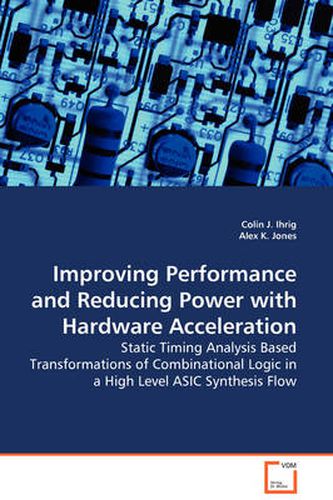Readings Newsletter
Become a Readings Member to make your shopping experience even easier.
Sign in or sign up for free!
You’re not far away from qualifying for FREE standard shipping within Australia
You’ve qualified for FREE standard shipping within Australia
The cart is loading…






This title is printed to order. This book may have been self-published. If so, we cannot guarantee the quality of the content. In the main most books will have gone through the editing process however some may not. We therefore suggest that you be aware of this before ordering this book. If in doubt check either the author or publisher’s details as we are unable to accept any returns unless they are faulty. Please contact us if you have any questions.
Modern electronic design automation tools can be used to apply a variety of transformations to hardware blocks in an effort to achieve performance and power savings. A number of such transformations require tools with intimate knowledge of the design’s timing characteristics. Static timing analysis estimates the worst-case timing behavior of hardware data flow graphs. The static timing analyzer described in this book operates on data flow graphs which are generated as intermediate representations within a C to VHDL hardware acceleration compiler. Two additional tools were then developed which utilize the results of the static timing analysis. An automated pipelining tool was developed to increase the throughput of large blocks of combinational logic generated by the compiler. Another tool was designed to mitigate power consumption resulting from combinational glitching. By inserting special signal buffers with preselected propagation delays, known as delay elements, functional units can be kept inactive until their inputs stabilize. This book explores these tools as well as the various design tradeoffs resulting from their use.
$9.00 standard shipping within Australia
FREE standard shipping within Australia for orders over $100.00
Express & International shipping calculated at checkout
Stock availability can be subject to change without notice. We recommend calling the shop or contacting our online team to check availability of low stock items. Please see our Shopping Online page for more details.
This title is printed to order. This book may have been self-published. If so, we cannot guarantee the quality of the content. In the main most books will have gone through the editing process however some may not. We therefore suggest that you be aware of this before ordering this book. If in doubt check either the author or publisher’s details as we are unable to accept any returns unless they are faulty. Please contact us if you have any questions.
Modern electronic design automation tools can be used to apply a variety of transformations to hardware blocks in an effort to achieve performance and power savings. A number of such transformations require tools with intimate knowledge of the design’s timing characteristics. Static timing analysis estimates the worst-case timing behavior of hardware data flow graphs. The static timing analyzer described in this book operates on data flow graphs which are generated as intermediate representations within a C to VHDL hardware acceleration compiler. Two additional tools were then developed which utilize the results of the static timing analysis. An automated pipelining tool was developed to increase the throughput of large blocks of combinational logic generated by the compiler. Another tool was designed to mitigate power consumption resulting from combinational glitching. By inserting special signal buffers with preselected propagation delays, known as delay elements, functional units can be kept inactive until their inputs stabilize. This book explores these tools as well as the various design tradeoffs resulting from their use.